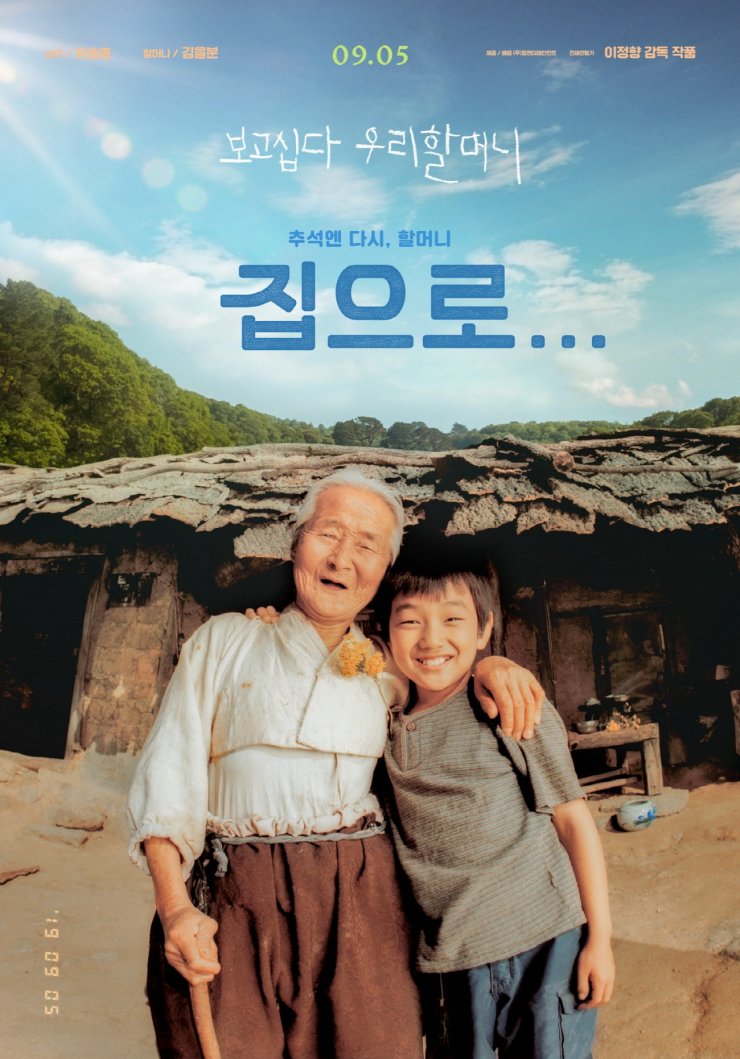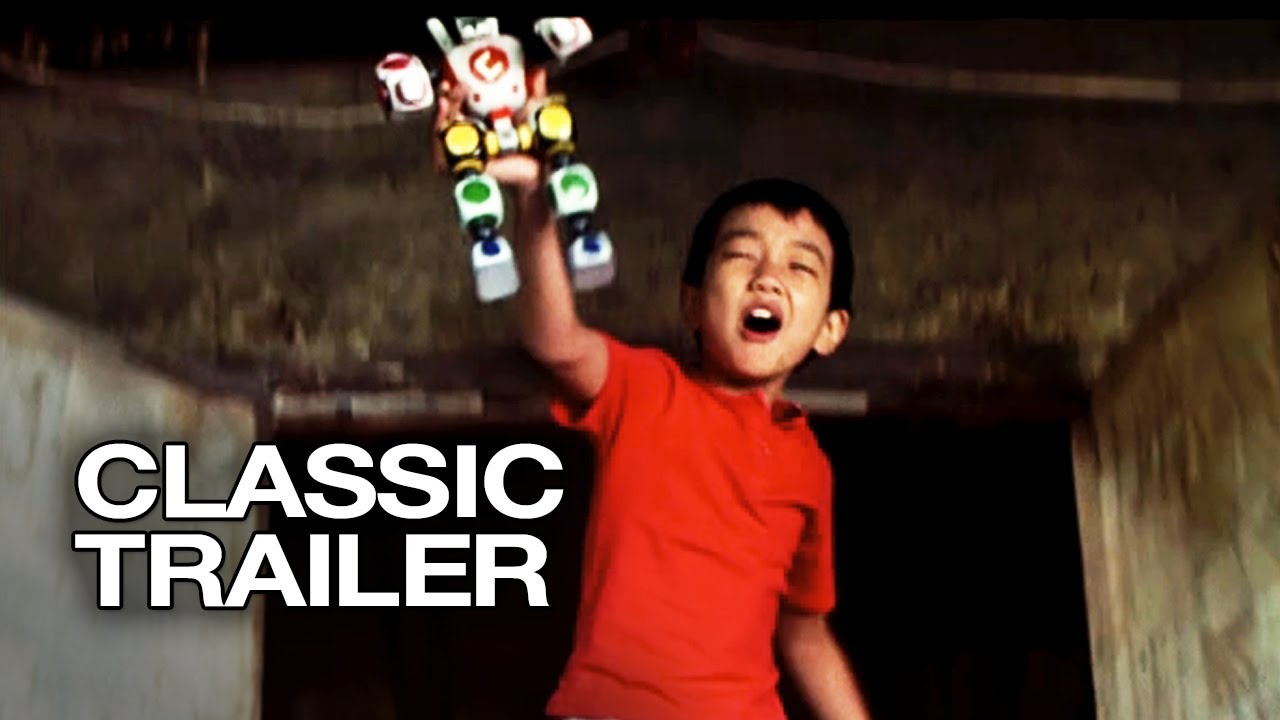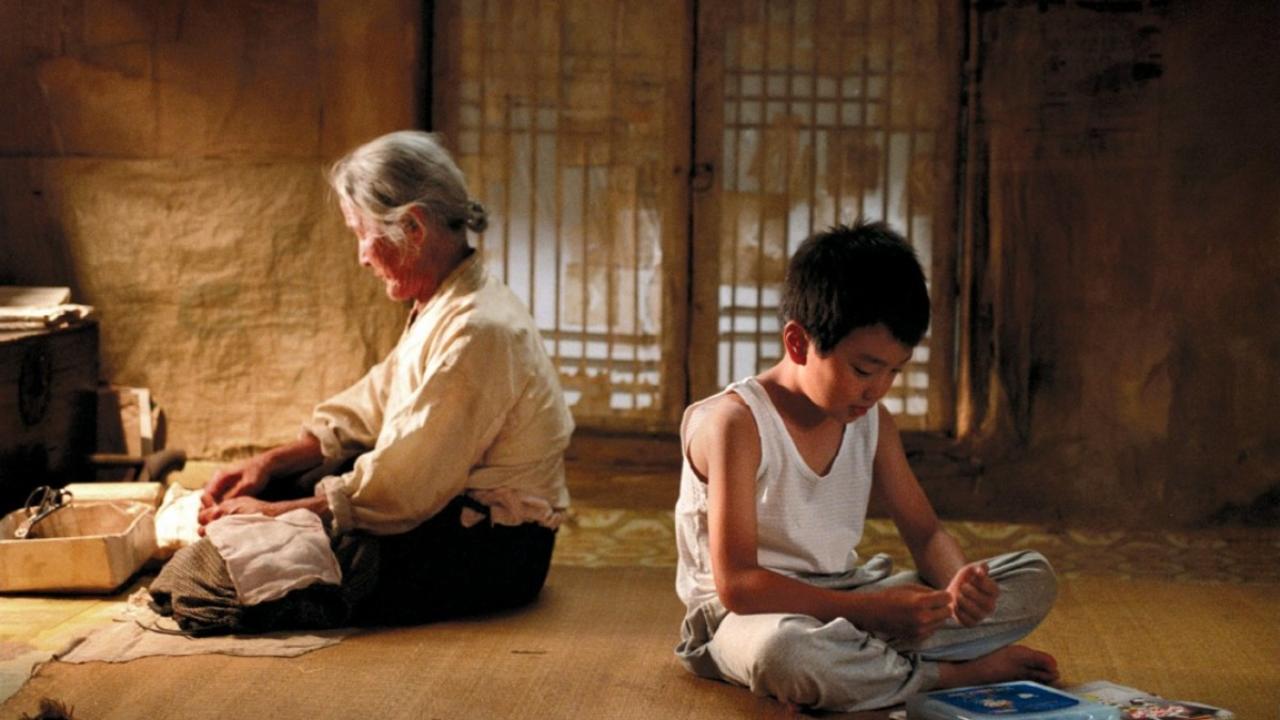The Way Home - A Heartwarming Journey Of Family And Redemption
"The Way Home" is a poignant and emotionally charged film that explores themes of family, redemption, and the power of love. Released in 2002 and directed by Lee Jeong-hyang, this South Korean drama beautifully captures the struggles and triumphs of a young boy named Sang-woo and his relationship with his grandmother.
Author:Maxwell CanvasReviewer:Caden SteelheartJun 03, 202316.1K Shares298.1K Views

"The Way Home" is a poignant and emotionally charged film that explores themes of family, redemption, and the power of love. Released in 2002 and directed by Lee Jeong-hyang, this South Korean drama beautifully captures the struggles and triumphs of a young boy named Sang-woo and his relationship with his grandmother.
Through stunning cinematography, nuanced performances, and a heartfelt narrative, "The Way Home" takes viewers on a transformative journey that emphasizes the importance of compassion and understanding within the family unit.
| Genre | Drama |
| Original Language | Korean |
| Director | Jeong-Hyang Lee |
| Producer | Woo-Hyun Whang, Jae-woo Whang |
| Writer | Jeong-Hyang Lee |
| Release Date (Theaters) | Nov 15, 2002 |
| Wide Release Date (Streaming) | Nov 7, 2017 |
| Box Office (Gross USA) | $444.9K |
| Runtime | 1h 26m |
The Way Home Movie Plot Summary
"The Way Home" is a heartwarming South Korean film that tells the story of Sang-woo, a young boy who is sent to live with his mute grandmother in a rural village. The film beautifully captures Sang-woo's transformative journey as he learns the value of family, compassion, and the simple joys of life.
The movie opens with Sang-woo's mother leaving him with his grandmother temporarily, promising to return soon. However, as days turn into weeks and weeks into months, Sang-woo's mother remains absent, leaving the young boy feeling abandoned and longing for her return. His initial bitterness and frustration are evident as he struggles to adapt to the quiet and simple life of the village.
Sang-woo's grandmother, played by Kim Eul-boon, is a woman of few words but immense love and patience. Despite her son's absence, she wholeheartedly embraces Sang-woo, caring for him and showering him with affection. However, Sang-woo, blinded by his own disappointment and anger, rejects her kindness and rebels against her strict and traditional ways.
As the film progresses, Sang-woo begins to witness his grandmother's unwavering dedication and selflessness. He observes her arduous daily routines, from tending to their small vegetable garden to fetching water from a distant well. Slowly, he starts to comprehend the hardships she endures and the sacrifices she makes for him.
One significant event in the film involves Sang-woo's grandmother catching a grasshopper and placing it in a jar.
Fascinated by this act of capturing a creature and observing it, Sang-woo becomes engrossed in watching the grasshopper's movements and transformation. Through this experience, he begins to see the world with new eyes, realizing the beauty and wonder that can be found even in the simplest of things.
As time passes, Sang-woo's initial resentment starts to dissolve, replaced by a growing appreciation and understanding. He becomes more attentive to his grandmother's needs, helping her with household chores and engaging in small acts of kindness.
Their relationship gradually transforms into one of mutual love and understanding, transcending the barriers of language and communication.
"The Way Home" beautifully portrays the power of love, patience, and the unbreakable bond between family members. It showcases the importance of empathy and compassion, highlighting how these qualities can transform relationships and lead to personal growth.
The film's emotional climax comes when Sang-woo's mother finally returns to take him back to the city. Although he longed for this moment, Sang-woo realizes that leaving his grandmother behind would mean leaving behind the valuable lessons she has taught him and the newfound love he has discovered.
In a heart-wrenching decision, Sang-woo chooses to stay with his grandmother, recognizing the depth of their connection and the profound impact she has had on his life.
"The Way Home" is a poignant tale of self-discovery, emphasizing the significance of family, understanding, and the ability to find joy in the simplest of moments. Through its touching narrative and genuine performances, the film leaves a lasting impression, reminding viewers of the power of love and the transformative nature of human connections.
Themes And Emotional Impact
"The Way Home" explores profound themes that resonate deeply with audiences, touching their hearts and leaving a lasting emotional impact. The film delves into the power of love, the importance of family bonds, and the beauty found in life's simplest moments.
It captures the essence of human emotions, evoking empathy, compassion, and a renewed appreciation for the things that truly matter.
One of the central themes in "The Way Home" is the transformative power of love. The film portrays the unconditional love between Sang-woo and his grandmother. Despite Sang-woo's initial rejection and resistance, his grandmother demonstrates unwavering love and patience.
Her acts of kindness, from preparing his meals to mending his clothes, are expressions of love that gradually break down the walls around Sang-woo's heart. As he witnesses her selfless acts, Sang-woo learns to reciprocate that love, leading to his personal growth and a deepening of their connection. The film beautifully illustrates the transformative impact love can have, reminding viewers of the profound changes that can occur when we open ourselves to the love of others.
Family bonds are another significant theme explored in "The Way Home." The relationship between Sang-woo and his grandmother highlights the importance of familial connections, even in the absence of biological parents.
Through their journey, the film emphasizes the idea that family goes beyond blood ties and is built on a foundation of love, care, and mutual understanding. It shows that family can be found in unexpected places and that the bonds formed through shared experiences and genuine affection can be just as strong as those created by blood relations.
The film also sheds light on the beauty and simplicity of life. Through the rural setting and the mundane activities depicted in the film, such as tending to the vegetable garden or fetching water from the well, "The Way Home" emphasizes the value of life's simple pleasures.
It invites viewers to pause and appreciate the small joys that are often overlooked in the hustle and bustle of modern life. The tranquil beauty of the village and the closeness to nature serve as a reminder that happiness can be found in the most ordinary of moments.

Jibeuro (2002) Official trailer # 1 - Foreign Drama HD
Acting And Visuals
"The Way Home" showcases captivating performances and breathtaking visuals that enhance the film's emotional impact and storytelling. From the nuanced acting to the stunning cinematography, these elements work in harmony to create a visually engaging and emotionally resonant experience for the audience.
The performances in "The Way Home" are exceptional, particularly from the two main actors, Yoo Seung-ho as Sang-woo and Kim Eul-boon as his grandmother. Yoo Seung-ho delivers a remarkable portrayal of Sang-woo, capturing the range of emotions experienced by the young boy, from his initial bitterness and frustration to his gradual transformation and growing affection for his grandmother.
His ability to convey complex emotions through his facial expressions and body language is a testament to his talent as an actor. Yoo Seung-ho's performance is both nuanced and heartfelt, drawing the audience into Sang-woo's emotional journey and allowing them to connect with his character on a deep level.
Kim Eul-boon, in her role as the mute grandmother, delivers a truly remarkable performance. Without the use of words, she communicates a depth of emotion that is both powerful and moving. Through her facial expressions, gestures, and subtle nuances, she conveys the love, care, and strength of her character.
Kim Eul-boon's performance is a masterclass in silent acting, showcasing her ability to convey a multitude of emotions without uttering a single word. Her portrayal is filled with warmth, grace, and a quiet strength that leaves a lasting impression on the audience.
In addition to the outstanding performances, the film's visuals are equally captivating. The cinematography, directed by Kim Myung-joon, beautifully captures the natural beauty of the rural village and its surroundings.
Through the use of wide-angle shots, the audience is transported into the tranquil countryside, immersing them in the simplicity and serenity of the setting. The lush green landscapes, the rustic charm of the village, and the changing seasons are captured with breathtaking detail, enhancing the visual experience and adding to the overall ambiance of the film.
The cinematography also plays a crucial role in conveying the emotions and the evolving relationship between Sang-woo and his grandmother. The camera often lingers on their faces, allowing the audience to observe the subtle changes in their expressions and the unspoken connection between them. The visuals effectively capture the intimacy and the depth of their bond, showcasing the power of non-verbal communication.
The film's visual style is further complemented by the art direction and production design. The attention to detail in recreating the simple yet authentic setting of the rural village adds a layer of authenticity to the film.
The meticulously designed interiors, the humble dwelling of Sang-woo and his grandmother, and the rustic elements of their surroundings create a visual world that feels lived-in and genuine.
Movie Reviews
A user on IMDb says,
I saw this movie a few weeks ago in my korean school, and thought it was pretty good. I had just recently found out that it was out in theatures. The grandma is a simple, loving mute and deaf grandmother, forced to take care of her daughter's whiny son. The boy does everything to annoy his grandmother, making me (and others, i bet) to smack that annoying brat upside the head and give him a good kick. Overall, it is an okay movie, but nothing i'll remember all my life. 7/10
People Also Ask
What Is The Plot Of The Movie "The Way Home"?
"The Way Home" tells the story of a young boy named Sang-woo who is sent to live with his grandmother in a rural village. The film explores his journey of adjusting to the simple lifestyle and the evolving relationship with his grandmother.
Who Directed The Movie "The Way Home"?
"The Way Home" was directed by Lee Jeong-hyang, a South Korean filmmaker known for her poignant and character-driven storytelling.
What Are The Themes Explored In "The Way Home"?
"The Way Home" explores themes of family, love, redemption, intergenerational connections, the power of compassion, and the contrast between modernity and traditional values.
What Is The Emotional Impact Of "The Way Home"?
"The Way Home" has a profound emotional impact as it delves into the struggles and transformation of the young protagonist, highlighting the importance of empathy, understanding, and the bonds of family. The film elicits feelings of compassion, appreciation, and reflection on the simplicity and beauty of life's moments.
How Were The Performances And Visuals In "The Way Home"?
The performances in "The Way Home" are remarkable, particularly by Yoo Seung-ho as Sang-woo and Kim Eul-boon as the grandmother. Both actors deliver compelling portrayals that effectively convey the emotional depth of their characters. The visuals in the film are also captivating, with stunning cinematography that showcases the beauty of the natural landscape and village life, enhancing the overall storytelling experience.
Conclusion
With their grandchildren, grandparents tend to have a more exclusive bond. They frequently forgo the severe methods they imposed on their own children in favor of spoiling their grandchildren.
The Way Home examines a particular facet of this relationship, emphasizing the patience and enduring love that grandparents may bestow upon their grandchildren, despite their petulance and petty behavior.

Maxwell Canvas
Author
Maxwell Canvas, a charismatic and fearless crypto evangelist, defies conventions and blazes a trail in the realm of digital currencies. With his unique physique serving as a symbol of resilience, he challenges societal norms and proves that true expertise transcends appearances. Against a backdrop of a blurred and ever-shifting market, Maxwell's work becomes a masterpiece, painting a vivid picture of knowledge and inspiration.
With unwavering passion, Maxwell empowers others to embrace the transformative potential of blockchain technology. His captivating presence and unyielding dedication captivate audiences, turning skepticism into curiosity and igniting a spark of interest in the world of cryptocurrencies. Maxwell Canvas stands as a visionary force, leaving an indelible mark on the crypto landscape, inspiring others to explore decentralized possibilities and embrace a future of innovation and financial empowerment.

Caden Steelheart
Reviewer
Caden Steelheart, an enigmatic author, weaves tales that immerse readers in the depths of sin city's underbelly. With his words as a weapon, he crafts literary masterpieces that reflect the dark and dangerous spirit of the city. Caden's writing captures the gritty essence of sin city, delving into the intricacies of its characters and the moral complexities that define their existence.
Born amidst the shadows, Caden draws inspiration from the relentless chaos and unforgiving nature of the city. His words carry the weight of experience, creating a vivid and haunting portrayal of sin city's undercurrents. Through his stories, he explores the blurred lines between right and wrong, exploring themes of power, deception, and redemption.
Caden Steelheart's literary prowess has made him a name whispered in literary circles, captivating readers with his ability to immerse them in sin city's intricately woven tapestry. With each written word, he invites readers to journey into the darker realms of the human experience, offering them a glimpse into the secrets and sins that shape the city's inhabitants. Caden Steelheart, a master of capturing the essence of sin city through his writing, continues to captivate audiences with his haunting and evocative narratives.
Latest Articles
Popular Articles
